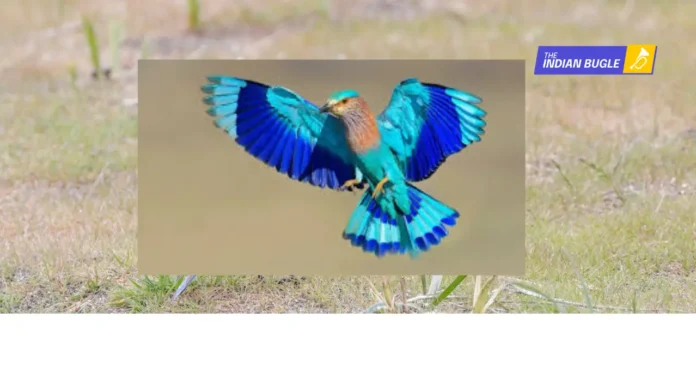Dussehra or Vijayadashami is one of the most celebrated Hindu festivals, symbolizing the victory of good over evil. While Ramlila performances, effigies of Ravana, and Durga Visarjan rituals dominate the festive landscape, there is another fascinating tradition deeply tied to this day — the sighting of the Neelkanth bird (Indian Roller). Considered auspicious, this small yet significant ritual reflects the spiritual connection between nature, mythology, and human life.
Who is the Neelkanth Bird?
The Neelkanth (Indian Roller, scientific name: Coracias benghalensis) is a vibrant bird with striking blue wings, often seen across India. It gets its name “Neelkanth,” meaning “the one with a blue throat”, from Lord Shiva, who is also revered as Neelkanth after consuming the deadly poison during the churning of the ocean (Samudra Manthan) to save the universe.
Thus, the bird is not just a natural beauty but also carries divine symbolism of protection, sacrifice, and transformation.
Mythological Significance of the Neelkanth on Vijayadashami
- Association with Lord Shiva
- Just as Lord Shiva absorbed the poison to save the world, the Neelkanth bird is seen as a reminder of his divine energy and power on Vijayadashami.
- Sighting the bird is believed to bring courage, clarity, and blessings from Mahadev.
- Victory of Lord Rama
- According to folklore, when Lord Rama defeated Ravana on Vijayadashami, the Neelkanth bird was seen flying in the sky, signifying divine approval and the cosmic victory of dharma over adharma.
- Blessings of Goddess Durga
- In some traditions, spotting the Neelkanth after Durga Puja symbolizes Maa Durga’s blessings and her promise of protection to devotees as she departs to her heavenly abode.
Cultural and Regional Practices
- North India (especially Uttar Pradesh & Bihar):
People believe that sighting the Neelkanth bird on Vijayadashami ensures success, prosperity, and protection from evil influences for the coming year. - Maharashtra & Madhya Pradesh:
Families make offerings to the bird or pray after spotting it, considering it a messenger of divine will. - Rural India:
Farmers especially consider the sighting of Neelkanth auspicious as it marks the beginning of the harvest season and is believed to bring abundance.
Symbolism of the Neelkanth Bird
- Spiritual Renewal: The blue throat signifies purity and strength in absorbing life’s negativity and transforming it into wisdom.
- Victory & Good Fortune: Just as Dussehra celebrates victory, the bird is a living omen of future success.
- Balance of Nature & Faith: The tradition highlights the harmony between cultural beliefs and ecology. Protecting the bird becomes an act of devotion in itself.
How Devotees Observe This Tradition
- On Vijayadashami morning, people often step outdoors hoping to catch a glimpse of the Neelkanth bird.
- Some families recite a short prayer upon sighting it, asking for protection, wisdom, and happiness.
- In villages, children are told stories of the bird’s role in Lord Rama’s victory, passing on cultural values to the next generation.
Conservation Angle — Respecting the Sacred Bird
Ironically, the spiritual significance of the Neelkanth bird also protects it from hunting. In many rural communities, harming the bird is considered highly inauspicious. This cultural belief plays an important ecological role in safeguarding the species.
The Neelkanth bird, with its dazzling blue plumage and mythological roots, adds a unique dimension to the celebration of Vijayadashami. More than just an auspicious sighting, it embodies divine grace, courage, protection, and the eternal triumph of good over evil. Spotting the Neelkanth on Dussehra is like receiving a gentle reminder from nature itself that light will always prevail over darkness.
